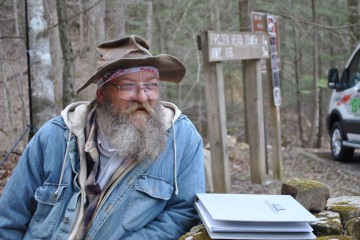Кликните на ссылку чтобы прочитать - РУССКОЯЗЫЧНУЮ ВЕРСИЮ.
His name is Gary Cantrell, but the world knows him as Lazarus Lake, or simply Laz. He's the evil genius of trail running, the mastermind behind the infamous Barkley Marathons, which in its more than 30 year lifespan only saw 15 finishers! Over the decades, Laz has become a living legend, and his twisted, creative races a thing of folklore.
Laz has been involved in ultrarunning since the 1970's and has been making trail running history for almost 50 years. Among his recent feats, last year Laz ran across North America from the east to the west coast, a journey of almost 3000 miles! This year Laz will celebrate his 71st birthday.
We at trail-run.ru were fortunate enough to chat with Laz and ask him a few questions about his Lazcon journey, about Soviet participants at Barkley, the Backyard Ultra series, and about how one can get into Barkley Marathons.
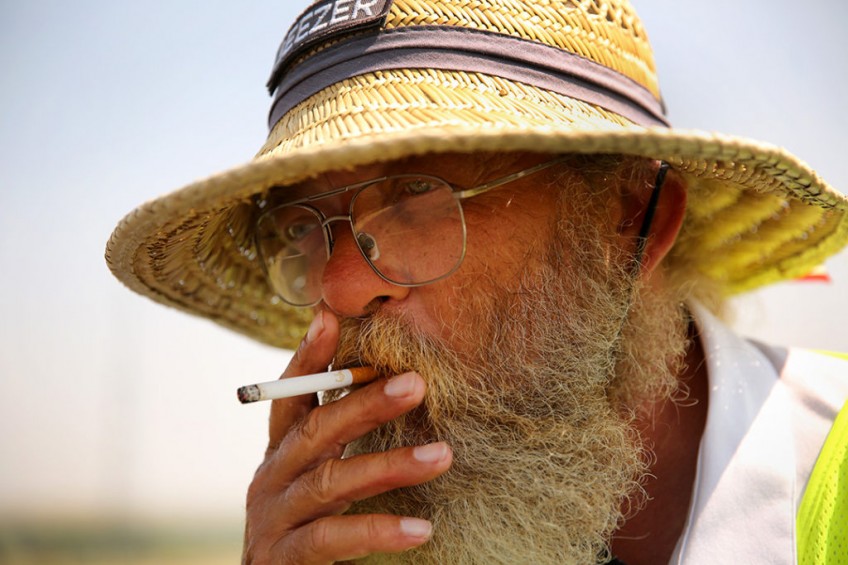
TRAIL-RUN: Hi Laz, and thank you so much for agreeing to chat with us! First of all, I want to ask you about your "name", Lazarus Lake. Where did this pseudonym originate?
LAZ: Back in the day, when I was registering my very first personal e-mail account, I started filling out all the stuff they require and first I put down my name and then I thought, well, this mysterious email stuff. Who knows where it goes? I don't know where it ends up. So I figured it would be best to put another name on there, not my real name. And then if people that know me get the mail, they'll know who it's from, and if they don't know me, then they won't know who it is. So I just pulled the name Lazarus Lake out of thin air and put it on there. Then I kind of forgot that I did that, until all of a sudden I realized there were people who thought my name was Lazarus Lake. So it just kind of stuck.
TRAIL-RUN: Well it suits you very well, I think, and now it's hard to imagine you by any other name. So, last year you ran across North America, 3000 miles, for one hundred and twenty six days. So why did you decide to do that, at age 70 no less? Did you just have a lot of free time or you were pursuing some kind of philosophical goals?
LAZ: People ask me that a lot. It seems to be the number one question, why did you do it? And I don't understand why anyone would not want to do it – it just seems like such a natural thing. We are really fortunate to live in a place where the political subdivisions allow me to go from one ocean to the other - all the way across, more than five thousand kilometers of continent, and not once have to produce an I.D. or have a passport. I just wanted to do it. I thought that it would be a great adventure but also be very hard, and when I started I didn't know for sure that I would make it to the end. I actually wasn't sure I would make it until I saw the Pacific Ocean, then I was pretty sure I could I would get the rest of the way.
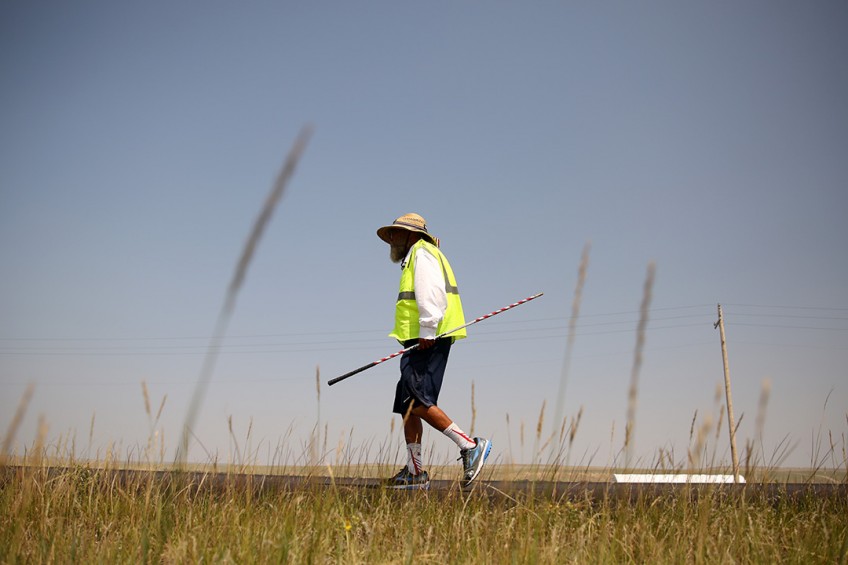
Lazcon 2018. Photo Credit: Mrs. Lazarus Lake.
TRAIL-RUN: You said you never had to produce a passport, but were there any parts of the country where you didn't feel so safe, or maybe less comfortable than others?
LAZ: No. Well, l I worried about the traffic on the road sometimes. For example, on Memorial Day weekend, when there is a great volume of traffic, I was in the middle of the Great Sandy Desert where there was not very much shoulder to run on. But as far as the people, I had thousands of interactions with people, and they were all good. And talking to other people who have done the Transcontinental run, the one thing everybody said, is that the people interactions were wonderful. Before you leave, people will tell you, be careful, there's all these crazy people out there and stuff. But most of the people were really positive and friendly, all kinds of people.
TRAIL-RUN: Well congratulations on finishing that, it was quite impressive.
LAZ: I thought it was probably the dumbest thing anyone in America did all year. It took a pretty good physical toll. I had done a lot of "journey runs" for fun, it is something I really enjoy doing. But this was just so long. I barely remember the first two weeks after I was finished. I think I was just in shock and just had lots and lots of sleep and rest.
TRAIL-RUN: But now do you feel the itch to do another adventure like this? Or are you still recovering?
LAZ: I'm still recovering. I started laying out courses for some short runs I could do around here - going places I hadn't been before. I think the next long one I've got is from Copper Harbor, Michigan to Miami, Florida, which is from the top of the center of the country down to the tip end of Florida, on the eastern coast. But that's only two thousand miles, because I don’t think I'm going to do something as excessive again, moderation is everything.
TRAIL-RUN: Ha, only two thousand miles.
LAZ: Well, last summer, I still felt pretty good the first thousand miles, and the last thousand miles went really well. And as a matter of fact, I got my times of the two, and there was only a difference of 16 minutes!
TRAIL-RUN: 16 Minutes, ha. Was it a negative split?
LAZ: No, I think I was a second a mile slower on the second one. I had some real problems with finding suitable roads in the middle of the country and ended up doing a lot of wandering around that was not getting me closer to the end, and was starting to get way behind schedule. So I had to push as hard as I could for the last fifteen hundred miles or so. And that really that I think that was what really killed me, was just having to push so hard. I made it with like two hours to spare.
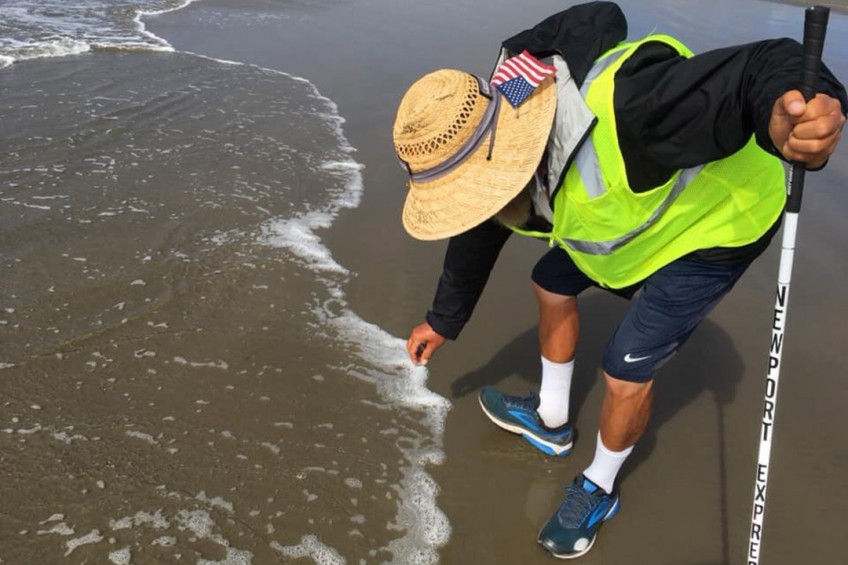
Laz touches the ocean on the Oregon coast after completing his cross-country trek. Photo Credit: Mrs. Lazarus Lake.
TRAIL-RUN: Well, it’s very interesting to hear from you firsthand. Of course we were following your journey online.
LAZ: I wrote my update every day. So many people helped along the way, and I felt like the only thing I had to offer back was to share the trip so that each one of them, who had a small piece of it, would get to see the whole thing. But you're so isolated out there that you don't really have any way of knowing if anyone is reading what you’re saying, or reading it and thinking, this guy has lost his marbles. You're just really alone.
There are many places out west where there are not many towns or stores, and I spent lots of time crossing deserts and mountains. Then you're just hoping that someone will show up to replace the person who is crewing you. At Riverton, Wyoming there was 100 miles to another town in either direction. The crew that had gotten me there left me at a motel and left, and I didn't know for sure if there would be a crew the next morning. So I thought well, if no one shows up I guess I'll stay in this motel and rest a few days, then try to see if I can figure out how I get home. But the next morning I woke up and went outside and there was someone in their car in the parking lot that had come to pick me up and go.
I've been collecting names of people that helped in some way or another along the way. And I've got a list of about 200 names. I'm trying to use what was left over from my budget and make t-shirts that say “Lazcon” because all of those people were a small part of it. They have already participated and maybe some will do their own journey because it’s a tremendous adventure. But I'd advise not waiting until you get old because it's really hard on your body.
TRAIL-RUN: But that's when you have the time, right?
LAZ: That's right. There’s a window for doing this: after you retire, but before you physically can't do it anymore. That's a pretty narrow window. So then I started figuring it out and realized I'd better go quick because I wasn't sure how long my body would still be able to take that kind of a beating. I got a stress fracture in my hip with about 500 miles to go. It was too far and it was too close. It was too close to stop. But, man, that's a long ways to go with a broken hip.
TRAIL-RUN: So you managed to run 500 miles with a broken hip?
LAZ: Well. I just walked mostly.
TRAIL-RUN: Is it all healed now?
LAZ: It's a lot better I think. I still have to prop my leg up just right to keep pressure off of it at night, but I've been able to do some walking and getting around. I missed a step the other day and came down on it really hard, so I held my breath. And it wasn't an intentional test but it was a test, and it says it's mostly healed. It's hard to hurt your hip because you can't just not use it, you know. You can be careful with it, but you have to use it.
TRAIL-RUN: Yeah, I know that all too well. But if you don't mind I'm going to ask you a few questions about the Barkley marathons, since it is your “staple”?
LAZ: It is the popular one, but the Backyard Ultra is catching up with the Barkley as far as people's interest. I think everyone can envision themselves doing a Backyard.
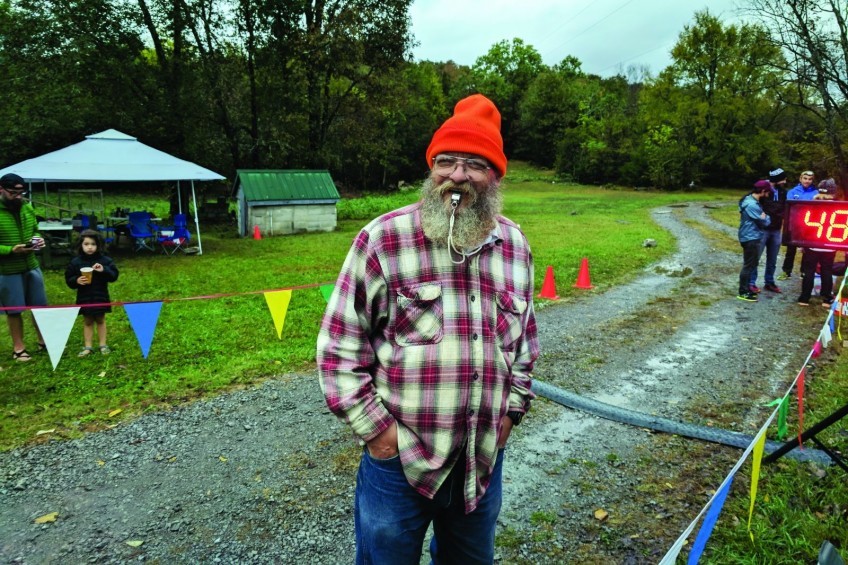
Big's Backyard Ultra 2016. Photo by Seth Wolpin.
TRAIL-RUN: Yes, we translated Trail Running Magazine's fantastic article about the Backyard Ultra into Russian and I think that was one of the most popular articles that we published last year, it really resonated with a lot of people. I think it maybe rings close to the Russian national character?
LAZ: I think is would really be cool to have a Russian Backyard event, as you know, it branched out. Now there are Backyard Ultras all over the world and we are giving out golden tickets to Big’s Backyard because it's gotten so well known. It's kind of like a world championship. And it would be great to have a Russian race. And then your winner can come and see if they could compete with the best Backyard runners in the world.
TRAIL-RUN: We can definitely throw that idea out there! I find the concept of it very deeply fascinating because, for example, I also run long distances but I just run them for such different reasons. I'm sure there are some other people who look at me and think I'm crazy, but to me this is whole other level of crazy.
LAZ: Yes, it’s a different kind of mentality because you can’t just run off and leave everyone. A lot of why its catching on is because its really a participation event. And you don't have to be fast. You don't have to have the goal of winning, just to see how far you can go. You may also have a couple where the wife is a really serious runner, and that husband is just a recreational runner. So here they can both go, and when he's done, he can be the crew or vice versa. People like to see how far they can go or watch others go, and then for the serious ones if it's a real head game. It's very mentally difficult because you don't know when it'll end.
You know in order to win the other person has to quit. But runners become very close to each other going through this ordeal. People run together - fast people, slow people, they can all do some laps together and talk. And later in the game it gets down to just a few and they know these other people have to quit for them to win. But then when the person wants to quit, they're sad and try to talk them out of it, because they've become so close. So, I thought when we would do this interview, I would have mentioned the Backyard assurance. Russia needs a Backyard.
TRAIL-RUN: Well, trail running in Russia is still very young, it's just catching on. But hopefully within a couple of years we can also have something like that!
LAZ: It has the advantage of being very easy to put together, it doesn't require a lot of space and it doesn't have to be timed at all, because it's just a pass-fail test. They either make it or they don’t.
TRAIL-RUN: And a very dedicated Race Director who’s willing to stay out for a really long time.
LAZ: Or maybe a team of people could do it. I'm just compulsive and don't want to trust anybody else. So I stay up for the whole race.
TRAIL-RUN: So, for the Big’s Backyard Ultra you mentioned that there's a bunch of other races now with the same concept. How many races, and where are they?
LAZ: Let's see. This year we have ten around the world that have golden tickets. There is one in Hong Kong, Australia, New Zealand, Sweden, Denmark, England and Ireland. I don't remember the other countries. I know there are other ones popping up – I think Singapore will have one, Japan, as well as Italy. And so now we have the backyard ultras as a type, so I changed the name of ours from Backyard Ultra, it used to be called that because it was the only one. But now there's so many of them and they call themselves backyard ultras. So this is Big, it’s named after Big.
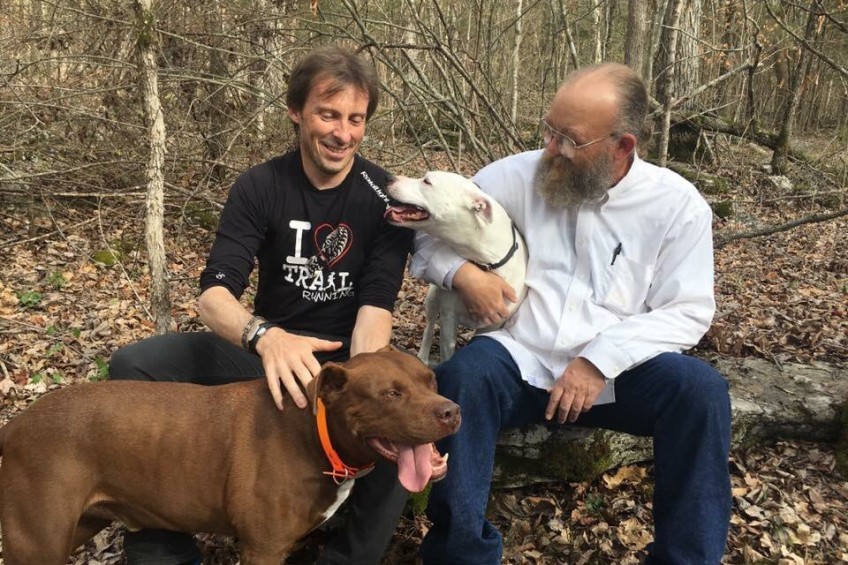
Benoit Laval (Raidlight) and Lazarus Lake, and also BIG and Little Dog.
TRAIL-RUN: So only the winner gets the golden ticket, or is it male and female?
LAZ: No, there's only one winner. The women actually can compete on a very even basis with the men. It is very clear that the advantages of size and strength and speed are taken away and it just becomes your mind and your willingness to step up to the line. And the women from the very beginning have done really well and gotten down to the very end. Several times one of the last two has been a woman. And I keep hoping to see a woman win, but so far in the end it's been the woman who blinks.
TRAIL-RUN: Maybe women are just a little bit smarter and they know when to quit?
LAZ: That could actually be. You think in the backyard race you could actually measure the intelligence, and it would be inversely proportional to where people finish? But you were going to ask a Barkley question.
TRAIL-RUN: Yes. We have a whole bunch of Barkley questions. So you named the race after your friend Barry Barkley right? Who is he, and why did he get the honor of having a race named after him?
LAZ: He's just a friend of mine who's helped us put on ultras since the very first one forty years ago. And so when I started the Barkley marathons, I just put his name on it. It was an unnamed race and it needed a name, and he was a big part of all the things we've done. So I thought it would be appropriate to put his name on it. Now, of course, it's known all over the world, that I say that is probably because we took Barry’s name, without his name it wouldn’t have been so successful.
TRAIL-RUN: Well, it's definitely become well known over the world. Even people who know nothing about running or ultra running, and have no idea what, for example the UTMB is, will have heard of the Barkley Marathons.
LAZ: Yes, and that is crazy because there are all these races with the big organization and all the money, and really the Barkley is just a couple of old hillbillies from a mountain that live out in the woods.
TRAIL-RUN: And you don't even charge an entry fee!
LAZ: We charge a dollar and 60 cents to apply. And then, if you get accepted, the first time you come you bring a license plate from your home state or your home country, which I’m sure you’ve seen if you've seen pictures of the Barkley. Usually people like to take pictures of all the license plates. Yeah, those are the Barkley’s trophy case, because the Barkley wins more than it loses. And if you get in after the first year, then we usually charge a shirt or a pair of socks. That way I get boxes of shirts, socks or whatever items that I need, so I don't have to go to the store. Interestingly enough, many years ago when we had a number of entries from the old Soviet Union who all came the same year, the shirt that I got from Russia was made with the softest material I ever owned, it was one of my favorite shirts. It's worn out now, of course. So I keep hoping that another Russian will bring me a shirt from that same material, if it even still exists.
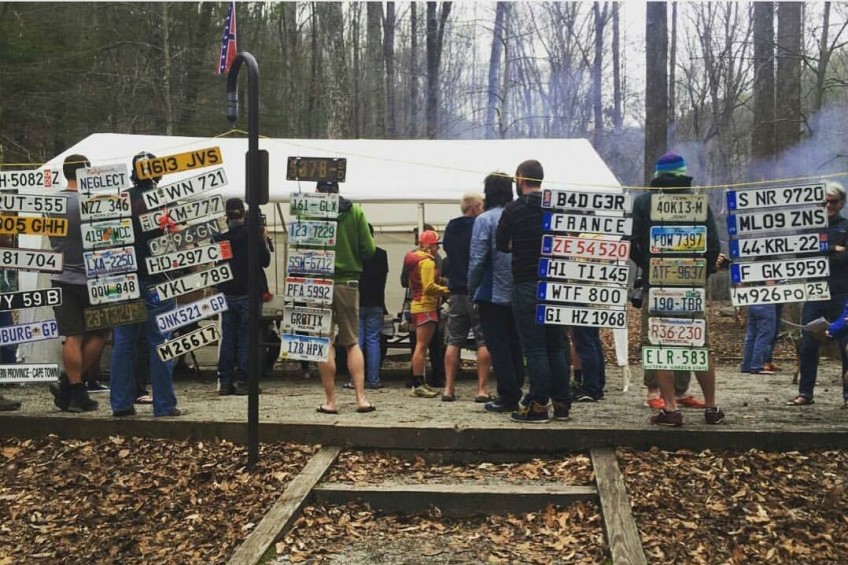
TRAIL-RUN: So have you had many Russians apply to the race?
LAZ: We do have an entry this year from – it’s called the Russian Federation now, right? But I won't know until he gets with his shirt if it fits or its quality.
TRAIL-RUN: Recently a non-Russian friend commented to me, “I don't understand why there aren't more Russian ultra runners, because suffering is such a part of your national identity, it’s your favorite pastime.”
LAZ: Back in the 80s there were a lot of really, really good Russian ultrarunners, but then again, you didn't see very many regular people running then. Regular people couldn't get out of Russia to run. So then only the top athletes ever got to go anywhere. But yeah, they distinguished themselves as being very, very tough. And I think hardship and adversity is something you get better at, it's an acquired skill. Not probably one that everyone wants, but after it's over you know that you're better for it. As a human animal that's just something that we have evolved to do. And if you don't have any pain, you look at people who always have it easy, many of them are the unhappiest of them all. So if life doesn't give us great challenges we make them intentionally.
TRAIL-RUN: But you did have several Russian participants over the years. For example, do you remember Nikolai Safin? Unfortunately, he died in a traffic accident several years ago. Or maybe some other Russian participants?
LAZ: We remember Nikolai quite well. We called him “Mr. Super Fantastic” because I think that was most of his English. That's what he kept saying repeatedly throughout the Barkley, he just kept repeating, “super fantastic”, “super fantastic”. He was probably as physically capable of running the whole thing as anybody that ever showed up. Unfortunately, his route finding skills left a lot to be desired. But if he could have learned to use a map, he would have had a real good chance. Then we had ten people from the Soviet Union who all came together one year. And we actually accepted more than our usual number of entrants that year because we had that whole group who wanted to come together, and it was still the Soviet Union, so it was quite unusual. I know in the group there were a Georgian and a Lithuanian and several Ukrainians. And I think the rest were Russians.
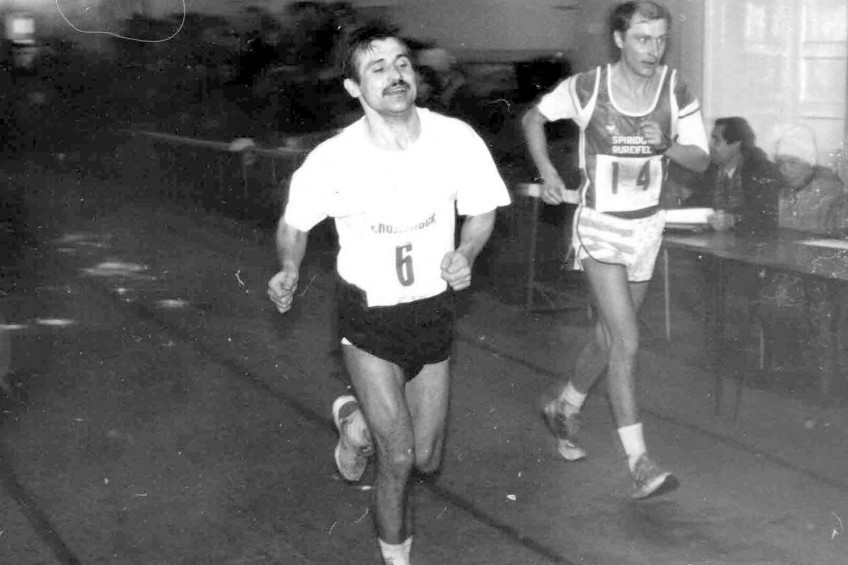
Nikolai Safin №6 1993.
TRAIL-RUN: How far did they all make it?
LAZ: One finished the Fun Run, maybe two. I know we had at least one that finished the Fun Run. They weren’t totally prepared for the way the race was, and a lot of local people helped them out with gear - water bottles and the necessary items. And they suffered a lot of losses as they went along, and got down and had kind of a meeting among themselves and decided that at least one of them had to make it. And the one poor guy – I can see him on my mind but I can't remember his name because the names were all so different – he gritted his teeth and made it, kind of as the representative, so that someone was going to finish at least the Fun Run. At one point we were talking to them after the race was over and they said they’ve never seen a race like that. And we said, “Oh, in America we run a race like this every week”. Then we had to admit the truth.
TRAIL-RUN: That's actually very interesting. This must have been, in the 80s, right? So well before Facebook and Netflix made the race known worldwide. So I'm wondering, how did they even find out about the race and how were they able to register for it?
LAZ: Well, they contacted me by mail, and then I talked to a lady in Ukraine who was a chemical engineer and a writer, and she was kind of like the organizing focal point there. There are actually a lot of stories to go with this that I'd be reluctant to repeat in a public interview. They had people that came with them who were part of the government apparatus, I guess, and they were quite disturbed because we had provided lodging for the runners before the race, and what we did was take their whole group and split them among different homes. So the 10 runners were living with 10 different families, and it caused high stress for those individuals to not have control over the group the whole time. And then also when they were out in the woods, you still can't control everything, there is not a fence or an enclosure. People wander off when they initially arrive. The person from the political apparatus who was with them told us that he was the only one in the group who spoke English, and that we would have to communicate only with him. But of course we found out after separating the group that a number of people could speak English, they just weren’t supposed to.
But it was it was really interesting to see all the cultural differences from the way that the two countries operated at that time. I know that one of the guys was a veteran of Afghanistan, and he had been a cook there. So he cooked for their whole group and we just provided him with food. They were able to eat a tremendous amount, which I can really relate to because I have a pretty good appetite myself. I know that that the first thing they wanted us to know is that the Russian people and the American people are not enemies. I think we know that people from different places usually can get along, not always the governments, but the people can get along. We've also had a couple of other Russians in intervening years, but I am not sure any of them came directly from Russia, they were all expatriates. And I am looking forward to meeting the guy who comes this year.
TRAIL-RUN: Great, we will be rooting for him. Can you disclose his name?
LAZ: I never tell people’s names that are on the entry list because over the years we've had some really well known runners, really famous ones. And as it turned out their trip to Barkley was something that they'd rather keep a secret, after it was over and didn't turn out as they expected.
TRAIL-RUN: And that's part of the tradition, right? You keep everything a little bit on the down low.
LAZ: Yeah, it's been kind of hard. It's a race with this much exposure, but really once you get beyond the superficial level it is still an inside race.
TRAIL-RUN: So why do you create so many difficulties for people who want to apply for the Barkley? There is no website, and applicants can only send an application at a certain time, or you won't even read it, and you never even say when you are supposed to send it. But then people still somehow find out?
LAZ: This is to reduce the number of people that have to be disappointed. It's really hard – they have to write an essay on why they should be in the Barkley, and you read a lot of essays from people that you would really like to take, but there are just so few places. It's a natural area with no development of any kind. And if we get beyond a certain number of people, we'll create trails just by the course traffic. So we hold it right at that level where it can remain “wild” from year to year. I think an expert woodsman could look and see that we've been there, but for most people it will appear untouched.
TRAIL-RUN: So how many essays do you go through?
LAZ: This year I'd say it was only about six or seven hundred.
TRAIL-RUN: Six or seven hundred?! That's a lot of reading.
LAZ: Yes, a lot of time going through these things. Brevity is welcome, people who can make their point without making it ten page pages. If it is really long, I won't be able to read the whole thing. But even if people are not particularly articulate, they reveal things about themselves. We work to select a group of runners who will enjoy this challenge, who are there for the challenge, not just to say that they went. This is one reason why we don't list the names of people who are in it - and a lot of them will never say.
We also added a race called the Barkley Fall Classic that we hold in the fall, which is on a real regular trail and in the same park, but with a lot of the same terrain and even some of the same hills. And now that we can admit about 500 people there, it helps relieve the pressure off the Barkley itself, because of the people that run it, only about 30 percent make it. And of those some will ask, was that as hard as the Barkley? And then we have to tell them, no, it's not even close. Then they say, OK then, I’m not going to be presenting you an essay.
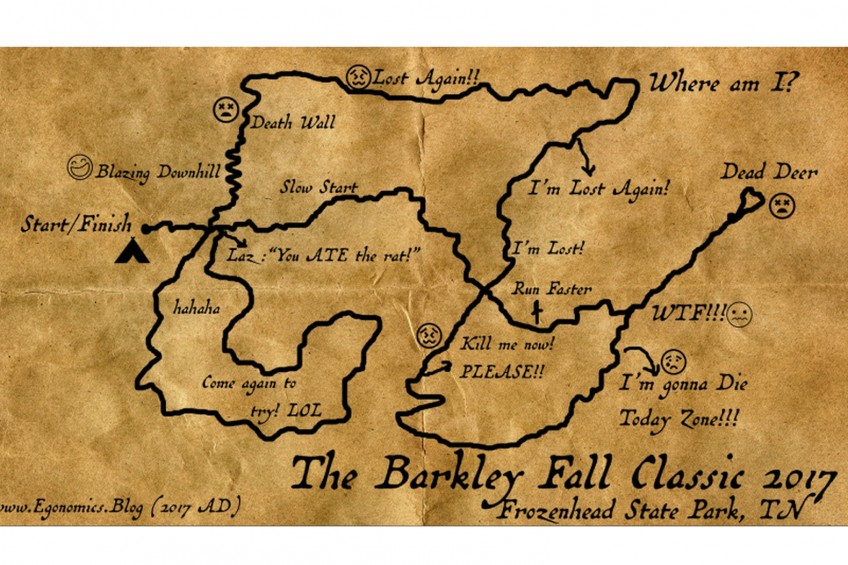
Race map photo © Gaurav Madan.
TRAIL-RUN: So have you considered making this race as a qualifier to even apply for the Barkley?
LAZ: For people in the U.S., that’s how I kind of look at it. We divide the field so that there are some elite athletes, and then also some spots for regular people, so a lot of different people can get a chance just to challenge themselves. Of course the elite runners are a pretty small group, well, I guess that’s what the word elite means, and so they have a good chance of getting in. But there are so many regular people, and here in the States where they can conveniently get here, it's become kind of a prerequisite. Not officially, but if you haven't done something spectacular, it means you can prove yourself there and we'll look at your resume and give you a shot.
TRAIL-RUN: Good to know!
LAZ: But for some of the people that come to the Barkley from overseas, it is a once in a lifetime trip. So then it is not reasonable to ask someone to make a once in a lifetime trip twice. I know that for me, if I was going to go run a race, say, in Russia, I'd only be able to do that about once. I don’t want it to become what a lot of the other races are. They have huge entry fees and huge requirements of qualifications and the equipment and the stuff you have to carry with you, then it really just becomes a feed of finance. You know, you can buy this sort of thing, there is a fiscal component, but a lot of it is just being able to afford it. And we really want it to be accessible for everyone, that’s why the entry fee is non-existent. The race is basically funded on donations. The people who can afford it donate money, and all the donated money goes towards the race. And it’s always been enough because people are good.
TRAIL-RUN: That's great. Of course, one wonders how you can finance a race like this, but it makes sense if there are private individuals who are sponsoring it.
LAZ: Yes, but they don't get a patch, and it's not a non-profit that can come off their taxes. We don’t list their names anywhere, so really they've all done it anonymously. But the Barkley is also a community, it's not just the race itself. There is a community of people, and some of the people in that community have never run it, and may never, but they have an email list and they talk among themselves. I don't think of myself as the creator of the race, more of a caretaker. I just kind of stumbled across it.
TRAIL-RUN: Yes, but the race has also become a legend that is now completely intertwined with your identity. Do you think Barkley marathons can exist without you there as its main face?
LAZ: I think so, yeah. I think that. The concept and the idea is something works. I have a guy that want to take over the whole range of races over time, because I'm not getting younger every year. I keep thinking I'll have an unbirthday and get one year less, but that still hasn't happened. So eventually someone will have to take the lead and I've been watching for the right person to come along, and I think I know the guy. He will take on more and more of it over the next few years when I'm too feeble to do it anymore.
I faced a real challenge the last few years because we always change the course a little bit so that it's new and challenging for everyone, and it's getting really difficult for me to go out there and put in the new books. I've never sent anyone to a place I haven’t been to myself, but it's getting harder and harder. I used to go out and put out all the books over a couple of days, when we go out one weekend and do all the high books one day and all the low books on the next. And then it got to be several weekends, and then over the period of a month or more. And for some of the last books we struggle just to put one book in. We leave first thing in the morning and we're struggling to get back before dark. Time is not kind.
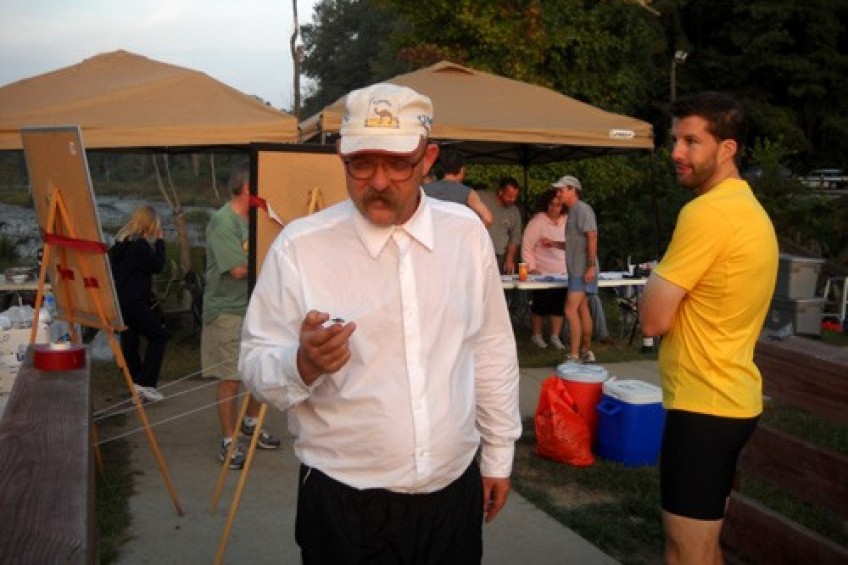
Laz в 2009 году. Photo by Sue Norwood and Jim O'Neil.
TRAIL-RUN: So you mentioned a “whole range of races”. So you have the Barkley, Big’s, then you said the Barkley Fall Classic, what else?
LAZ: And then we have the Volstate Road Race - it's a 500 kilometer race across Tennessee diagonally, starting out in Missouri and ending in Georgia. It's kind of like a mini Transcon, without having that requirement of taking all summer off. You can do it within a week. So we start on a Thursday and have a 10-day time limit, so it’s quite accessible for just average people. In a way, it's kind of the opposite of the Barkley, if you just don't quit you can finish it. It's entirely doable, but it's really hard. It's in the middle of the summer so we have temperatures around 100 degrees F or more, and humidity is about the same, and there are no aid stations, people just go by what they can carry and what they can buy.
We've been doing it for a number of years, and it's really kind of cool how it goes through rural areas and the people who live along the course have just embraced the race and the runners. You can be running through the countryside and out sitting by the road there will be a cooler with a sign on it that says “Valstate”, and inside people have left food or drinks or different things for the runners. People set up aid stations in their yards, the little towns have what they call “welcome centers” because they never heard of aid stations. They put a canopy with some shade where they have some chairs and a place where the runners can lay down and sleep. So at the end of the day, the way that the community has embraced the runners and the way the runners have embraced the local people, is really the nicest thing about it.
TRAIL-RUN: So is it mostly locals who do this race, or do you also get people from elsewhere?
LAZ: We get people from all over the country, and really from all over the world that come and do it. But the supporters are just the local people who live along the route and they treat the runners like heroes. I think it goes back to what I said before, that everyone would like to do something like that, it's just such an adventure. But it takes it takes a lot of courage just to take that first step. We start with a ferry ride across the Mississippi River - that's the biggest river in America - and those two steps off the ferry are the hardest because as soon as you’re off, you're on your own and you're completely reliant on yourself. The only thing that we'll be providing is if you call and say that you need to be picked up, then someone will come and eventually pick you up.
All the runners meet in a parking lot in Georgia on top of a mountain. And then we load them onto the tour buses and drive to Missouri, and as you do that drive over 500 kilometers, you realize that your car is a long way away. But there's something so liberating about it. People who are first timers will make these long lists of things they think you must have, and they find out after a few days that you actually need very little to survive. So it's become very popular, it's another one that sells out all the time.
Then we had the Strolling Jim, which is just a 40-mile race, so just a normal race. It's in real pretty countryside in the spring. It's a big social gathering, and we have a big picnic afterwards with everyone. It's very popular.
And then we have the ARFTA (A Race For the Ages), which is where people run the same number of hours as they are years old, and it’s just how about many miles you get in your hours. Everyone gets at least 40 hours. So if you're 40 or less it's a 40 hour race. If you're 60, it's a 60 hour race. So we have lots of different starts and the also the oldest person in the race will be the first leader, and when you start you're the youngest fastest freshest person there.
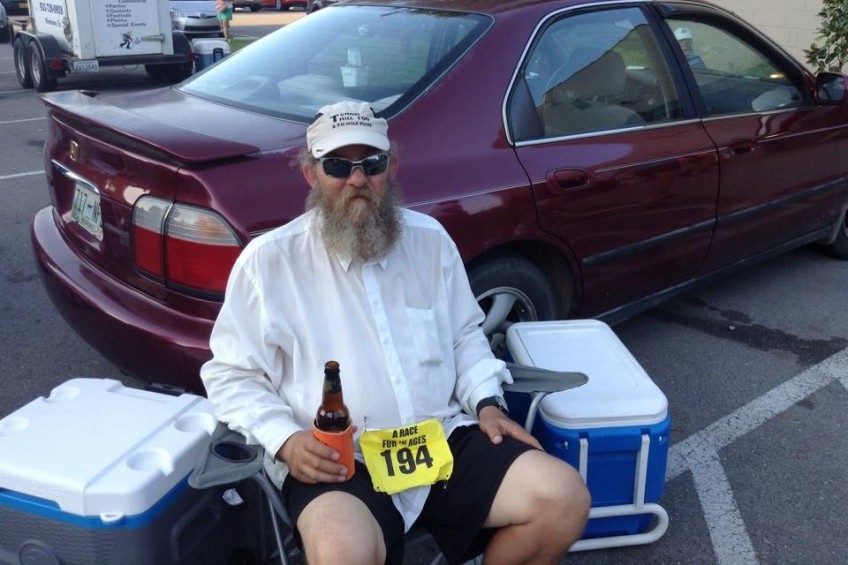
Laz ARFTA 2015. Laz got in 101 miles over 61 hours. Photo by Shar Hendrick.
TRAIL-RUN: So how old was the oldest person to complete this one?
LAZ: Eighty-six is about the oldest person that I remember participating. But we get a lot of the guys that were my peers from back in in the early days of ultra running in the US, so people who were world champions and record holders when they were in their 30s, and now they're 75 or 80 years old. They're not really as fast as they used to be and can't make time limits so they don't get to run in very many races, so the ARFTA is for them. It's a big get together for the people who ran ultras in the 70s and 80s, sometimes even earlier than that.
TRAIL-RUN: Well, I think I've held you long enough. Thank you so much for sharing all of this, it's been really great. Do you have anything you want to wish to our readers? I know you have suggested making a backyard race in Russia, but maybe some words of guidance or well wishing?
LAZ: I’ll say what I always tell everybody. The first thing, of course, is to dream big because you don't accomplish great things by setting small goals. And the second is to never give up. If you fail, then you go back and recalculate, prepare again, and try again. There are so many different things you can do with running that does not require you to be a wealthy person or have a lot of fancy things. And I look forward to seeing the Russian guy come over and run. Maybe this year he will be number 16.
TRAIL-RUN: Thank you so much, and good night!
Interviewed by Elizaveta Ershova
© Copyright










